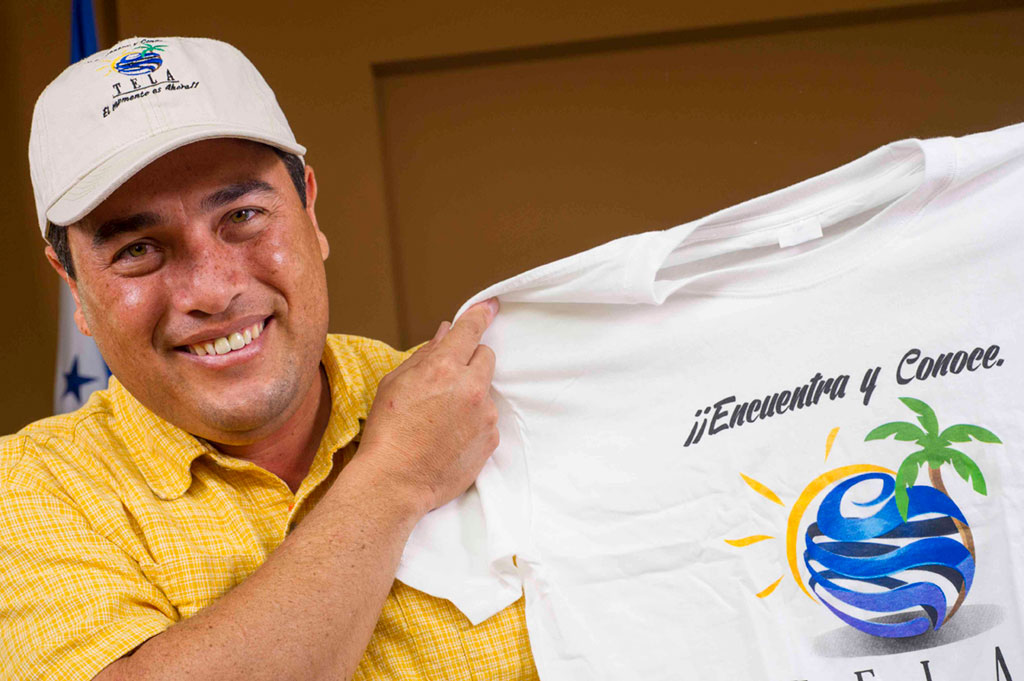TELA, Honduras – From the boisterous group drum circle and dancing outside the 15th of September neighborhood Outreach Center you would never know that residents in this very community were once shuttered inside—hiding from the gang violence that plagued their neighborhood.
“There was common robbery, there were gangs, drug sales. There were a lot of things that were not healthy for our kids,” says Teresa Benjarano, head of the community’s Board, known as the Patronato in Spanish.
The scene today is dramatically different. Children and adolescents flock to their neighborhood Outreach Center to play music and board games, practice English skills, take part in dance clubs and learn about healthy ways of resolving conflict.
“The arrival of the Outreach Center has not only been a door of opportunity, it has been a blessing in our community because it incorporated and strengthened actions that we had already started.” Teresa Benjarano, head of the 15th of September Community Board, Tela
The Outreach Center is part of a youth-focused crime and violence prevention program called Alianza Joven Honduras-USAID (Youth Alliance Honduras-USAID) that has helped to galvanize communities across the country, as well as the government and private companies to join efforts to prevent violence and expand opportunities for young Hondurans.
The five-year project, which began in 2012, is funded by the U.S. Agency for International Development and implemented by Creative Associates International.
For residents like Benjarano in at-risk communities, the project has mobilized critical resources and energy to make their neighborhoods safer. It has placed violence prevention at the top of everyone’s agenda—including families, officials and companies—from the local to national level.
“The arrival of the Outreach Center was a door of opportunities that is like water when you put out the fire,” says Benjarano. “The arrival of the Outreach Center has not only been a door of opportunity, it has been a blessing in our community because it incorporated and strengthened actions that we had already started.”
Communities own the progress
The transformation happening in the 15th of September community is not unique. In seven cities across the country, Alianza Joven Honduras-USAID has helped to launch and support 64 Outreach Centers in vulnerable communities.
The Outreach Centers are established in partnerships with local, religious or community-based organizations, often with support from the Government of Honduras and the respective Municipal Governments. The National Foundation for the Development of Honduras (FUNADEH in Spanish) is the project’s “legacy” partner and has been working alongside the Alianza Joven Honduras-USAID to ensure the gains and centers are sustained when the project officially closes in April this year.
At the heart of the Outreach Centers’ success is community leadership and ownership. Community volunteers and coordinators help to organize and run the center’s activities. The Outreach Centers have even created a certification system, through which volunteers demonstrate mastered skills and earn “Five Star Volunteer Certificates” for their service.

For many youth, the transition from Outreach Center beneficiary to volunteer can provide a critical sense of purpose, explains Salvador Stadthagen, Director of Alianza Joven Honduras-USAID.
“You see that the most powerful transformation when a youth goes from being just a beneficiary of prevention to being a volunteer in which there is youth-to-youth help and assistance,” he says.
Margarita Blandin, a coordinator at the Las Ayestas Outreach Center in Tegucigalpa, has seen the powerful effect the Outreach Center can have on young people in these neighborhoods.
“They all live in this environment that doesn’t allow them to accept that there is a different opportunity or chance or life for them,” she says. “I think that from the moment they [enter] they are offered a different space, where they move away from their reality.”
Inspired by the changes, more than 1,900 volunteers across the country, from youth to heads of community boards, have joined Alianza Joven Honduras-USAID’s efforts at Outreach Centers and through prevention campaigns.
Companies recognize a smart investment
Another key to the project’s success has been to make violence prevention everyone’s business, including the private sector.
Companies from telecommunications giant TIGO to commerce chains Lady Lee and PriceSmart have joined forces with Alianza Joven Honduras-USAID to supply Internet to Outreach Centers, to repair or construct Outreach Center facilities, donate gym equipment and sponsor national campaigns, among other initiatives.
Myriam McCormick, manager of Telamar Resort, which recently joined this list of private partners, says that supporting Honduran communities to thrive also helps Honduran businesses.
“If we work with the young adults right now, they are the future, future employees of the hotel. If we don’t give them the tools that they require to grow and to be exceptional, our companies don’t have a future. I think it’s a plan for sustainability, and we as a community, as Hondurans, also need to help each other to grow better,” she says.

One these private sector initiatives is investing in the future by providing youth marketable and in-demand workforce skills. Microsoft has teamed up with the project to develop seven “Microsoft Academies” in Outreach Centers with computers, software and instructors. Youth can earn certificates in Microsoft Office as a Specialist or Microsoft Technology Associate. Since their opening in December 2016, more than 220 youth have been certified and many more are taking courses.
For many of these youth, access to technology and workforce training is very limited, says Stadthagen, the project’s director.
“Bringing Microsoft Academies is a way that a youth can receive a certificate that is recognized internationally and valued by the private sector here in Honduras. It becomes a very valuable asset for these kids,” he says.
Another initiative the private sector supports, community gyms based out of the Outreach Centers, provide a safe space for neighbors to exercise and, for example, take group Zumba classes, something that wasn’t available in many of these communities before.
The program has made arrangements for several Outreach Center gym instructors to complete internships in private gyms and bring that experience back to their neighborhoods. Other Outreach Center gym instructors have been trained through an arrangement with local representatives of the American Aerobics Association.
Jader Soriano, a gym instructor at the Jardines del Carrizal Outreach Center in Tegucigalpa, says the gym is a positive distraction for the neighborhood youth.
“Instead of going to the same routine where they go see their friends or where they go to some corner to consume drugs or to have negative thoughts, they can come here to the gym and have better attitude, take care of their mind and take care of their body,” he says.
Prevention as a government priority
From the beginning, the project has found some of its biggest allies in the Government of Honduras, which has placed the issue of youth crime and violence prevention at the top of the national agenda.
From President Juan Orlando Hernández down to the municipal level, government entities have provided whole-hearted support to the Outreach Centers, contributing funds for their construction, providing stipends to volunteer coordinators and championing national campaigns and prevention methodologies.
Next year, for example, the National Prevention Program through the Secretariat of Education will introduce successful methodologies used by the Outreach Center for teaching conflict resolution and goal-setting through life-planning into the public school curriculum.
Residents in at-risk communities who once felt neglected and under-resourced have been buoyed by this strong investment in their neighborhoods.

“It’s incredible the effect of having the President come in and inaugurate an Outreach Center or the ministers coming in or important people like the mayor or the private sector coming in and saying: ‘We are here to help,’” says Stadthagen. “It creates a great feeling of not being excluded. It creates a feeling of inclusion that is extremely important.”
These committed government partners have taken notice of the changes in at-risk youth and vulnerable communities thanks to project-supported activities. They are committed to continuing the progress, in partnership with local communities and organizations, long after the project officially ends.
“The truth is that through these types of alliances we achieve greater investment in youth issues. These methodologies and programs proven… It is already a program that we know produces results,” says Youth Minister Feryd Bascha. “I think that when combined actions are taken in cooperation between government and civil society, and that all are interacting together and systematized, that is the moment when indicators are going to be moved because joint efforts are being made.”
With reporting by Emanuel Rodriguez
